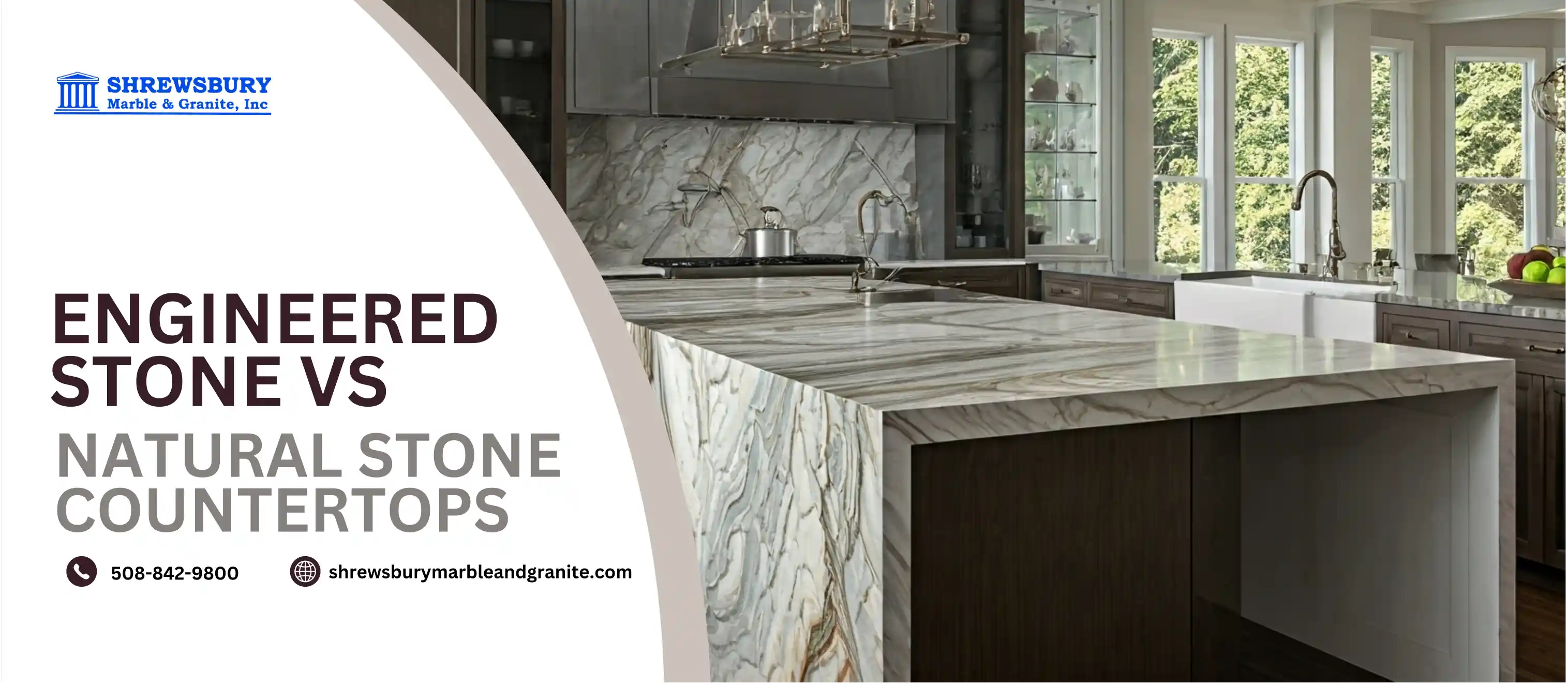
Choosing a new kitchen countertop material is one of the most important decisions for your kitchen or bath. The best material you select will be a part of your daily life for years, so it's worth understanding the practical differences between your main options and their price range, including stone surfaces. The choice usually comes down to two categories: materials created by nature and those designed by people.
This straightforward kitchen countertop material selection guide is here to help you compare Engineered Stone countertops vs. Natural stone countertops by answering the most common questions. Getting clear, factual answers is the best way to make a great decision, a principle that quality suppliers like Shrewsbury Marble and Granite stand by.
It is a single, solid slab of rock that was quarried from the earth, cut to specific dimensions, and polished for use in homes. Granite, marble, which is a type of metamorphic rock, and quartzite, as well as travertine, which is a form of limestone, are all common examples. Because these stones are products of complex geological forces, every natural stone countertop has a completely unique pattern, color, mineral structure, and unique veining. No two pieces in the world are exactly alike, which is a major part of their appeal.
While the variety of colors is vast, most homeowners choose from among these three primary types of naturals stones, specifically natural stone countertops:
The most important characteristic to understand is porosity. All naturals stones has tiny, microscopic pores. If left unsealed, these pores can absorb liquids and lead to staining from an acidic substance, potentially affecting the surface of the stones. To prevent this, your natural stone kitchen countertop will be treated with a penetrating sealer upon installation. You will need to re-apply this sealer yourself every few years. It's a simple process, but it is necessary for proper care. Also, because these slabs are extremely heavy, a professional natural stone countertop installation is essential.
The most popular version is engineered quartz, an engineered surface countertop surface. It's a composite slab made in a factory by combining about 90% crushed natural quartz with about 10% polymer resins and pigments. This mix is then compacted under intense pressure and baked to create a solid, non-porous surface.
Its key advantage is that it is completely non-porous. The manufacturing process ensures there are no pores for liquids to penetrate. This means an engineered quartz stone countertop is highly resistant to staining and, most importantly, never needs to be sealed, which significantly reduces maintenance costs compared to regular sealing of other materials. This makes it an extremely low-maintenance surface and a predictable option. Its appearance is also uniform and consistent from one slab to the next, contributing to its low maintenance requirements.
Yes, and they are important to know for the Engineered Stone countertops vs. Natural stone countertops stones decision. The resins that bind the quartz together have two main limitations:
Here's a simple breakdown of the key differences to help you choose:
1. Required Maintenance
2. Scratch Resistance
3. Heat Tolerance
4. Appearance
The best choice in the Engineered Stone countertops vs. Natural stone countertops debate is the one that best fits your lifestyle and priorities. If you love the idea of owning a unique piece of the earth, appreciate high heat tolerance, and are comfortable with the simple maintenance of sealing, then natural stones is a fantastic option that showcases its authentic stones qualities. If you prioritize zero-maintenance, guaranteed stain protection, and a consistent look-and are diligent about protecting the surface from heat-then engineered stones is likely the right choice for creating your dream kitchen.
Understanding these fundamental differences is the key to selecting a Engineered Stone countertops vs. Natural stone countertops you will be happy with for a very long time. For the final step of seeing and feeling these materials for yourself, a visit with the professionals at Shrewsbury Marble and Granite is the best path forward.